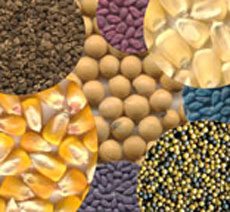
A Canadian government attempt to change United Nations policy on controversial genetically modified “terminator seeds” was defeated at a United Nations–sponsored gathering in Bangkok on Friday. Critics accused the Canadian representatives of promoting the commercialization of terminator seeds by advocating field trials at the UN meeting.
The vote by a subsidiary group of the UN Convention on Biodiversity ended a week of heated debate that included a fiery final speech by Percy Schmeiser, the Canadian farmer known for his courtroom battles over genetically modified seed with bio-tech giant Monsanto.
“The Canadian government has acted shamefully,” Schmeiser told the UN delegates. “It is supporting a dangerous, anti-farmer technology that aims to eliminate the rights of farmers to save and re-use harvested seed. Instead of representing the goodwill of the Canadian people or attending to the best interests of the biodiversity treaty, the Canadian government is fronting for the multinational gene giants who stand to win enormous profits with the release of Terminator seeds around the world.”
Stephen Yarrow, director of plant biological safety for the Canadian Food Inspection agency, disputes the way Canada’s position has been characterized by its critics at the meeting. Yarrow said the Canadian government has never supported the commercialization of the technology, known by the unlovely acronym GURTS, which stands for “genetic use restriction technologies.”
The sterile seed technology was created to protect the intellectual property rights of companies that have developed genetically modified seeds. Farmers would not be able to save and reuse “Terminator seeds” from year to year. Some critics fear that cross-pollination from sterile seeds could introduce sterility into existing food crops.
“GURTS is a complicated issue,” Yarrow told The Tyee. “It’s a new technology. The Canadian government has never supported commercialization. We think scientific data is needed, and we want to keep the door open. Field trials should be considered. The Canadian government does not support a categorical ban on GURTS field trials.”
The Feb. 11 vote, by the Subsidiary Body on Scientific, Technical and Technological Advice to the UN Convention on Biological Diversity, re-affirmed a de-facto moratorium on commercial development of the “suicide seeds.”
Early last week, Action Group on Erosion, Technology and Concentration (ETC Group) leaked Canadian government documents directing the Canadian delegation position on sterile- seed technology, which the ETC Group head called “the most controversial and immoral agricultural application of genetic engineering so far.”
The leaked documents, however, stopped short of clearly favouring commercialization. The proposed resolution, with wording contributed by the Canadian delegation, asked that “governments consider the development of domestic regulatory frameworks to allow for the evaluation of novel varieties, including those with GURTS, for field testing and commerical use.”
Yarrow agreed the resolution’s language could lead to commercial use of technology.
While Canada took a lead role in drafting the proposal, a coalition led by Norway, Sweden, Austria, the European Community, Cuba, Peru and Liberia successfully opposed it.
Critics say GURTS technology is a danger both to biodiversity and to the ability of farmers in the developing world to create their own seed supply.
In a phone interview with The Tyee from Bangkok last week, ETC Group spokesperson Jim Thomas condemned the Canadian delegation for its role in supporting GURTS field trials. “This is just a terrible draft, tabled in a sneaky manner late in the day,” said Thomas.
New Zealand and Australia backed the pro-GURTS draft language. The United States has observers at the Bangkok meeting but is not a party to the international agreement on biodiversity.
Robert McLean, head of the Canadian delegation in Bangkok, did not respond to The Tyee’s inquiries about the Canadian position. Will Cook, a media spokesman for Environment Canada, declined to comment.
Canadian agricultural scientist Ann Clark, of the University of Guelph, told The Tyee in an email interview that the move toward field trials is “draconican.”
“This whole initiative is entirely to the benefit of the seed trade, and to the detriment of farmers — all farmers,” said Dr. Clark. “It is not necessary to protect intellectual property.” She said moves to allow the use of “suicide seeds” are an inevitable consequence of the decision to allow their development, even though “it was known all along that individual genes simply cannot be contained.”
Clark said the technology “confers control over the entire seeds industry” to large corporations at the expense of “resource-poor farmers around the world who do not buy seed regularly” and “first world farmers who save seed.”
Clark said the commercial use of GURTS would not only threaten the livelihood of farmers, who would be increasingly dependent on big bio-tech companies for each year’s seed stock, but also risk contaminating crops in neighbouring fields. As a consequence, a portion of neighbouring farmers’ saved seeds “would be sterile,” Clark said.
Nadege Adam, biotechnology campaigner with the Council of Canadians, called the Canadian delegation’s Bangkok proposal “bad policy done in secret.”
“If commercialized, GURTS will force farmers to buy new seed every year,” said Adam. “The Canadian delegation’s advocacy for commercializing GURTS is unacceptable to all farmers, but in the developing South, it is a matter of life and death. Once more we see a Canadian government that is too tightly connected to industry and more concerned with promoting commercial interests than in the best interests of Canadians or farmers in the third world.”
Tom Sandborn is a frequent contributor to The Tyee.
Additional reading:














Tyee Commenting Guidelines
Comments that violate guidelines risk being deleted, and violations may result in a temporary or permanent user ban. Maintain the spirit of good conversation to stay in the discussion.
*Please note The Tyee is not a forum for spreading misinformation about COVID-19, denying its existence or minimizing its risk to public health.
Do:
Do not: